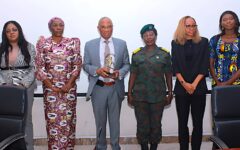University of Kinshasa Profile
2024-08-17 5:34University of Kinshasa Profile
The University of Kinshasa (UNIKIN) is a public institution of higher education in the Democratic Republic of Congo (DRC), and one of the oldest African universities. Its history started in 1924 with the creation, by the Catholic University of Louvain, of the Medical Association for Health and Education in Congo, which resulted in 1927 in the creation of the Medical Foundation of the University of Louvain in Congo (FOMULAC). In 1932, the University of Louvain created, a section of Agricultural Sciences, to which were added a section of Administrative and Commercial Sciences in 1936, and a section of Medical Assistants in 1937. In 1947, these three sections were grouped together under the name “Centre Universitaire Congolais de Lovanium”, which became the Lovanium University in 1952, later the University of Kinshasa, established at Mont-Amba in Kinshasa and covering an area of 400 hectares. The first academic year of this new university was inaugurated in 1954. Some major facilities of the University such as the University Clinics and the Nuclear Reactor TRIGA (Training, Research, Isotope Production Generated in Africa) were established in 1957. A part from the campus of the University of Kinshasa that spreads over 400 ha, the University also has 421 ha of agropastoral farm land that provides opportunities of science and innovations for integrated climate smart agriculture. The primary and secondary schools of Mont Amba are among the main entities of the University of Kinshasa.
To date, the University of Kinshasa has 13 faculties, five doctoral Schools and quite a number of researcher centres. The faculties include Law, Art and Humanity, Social, Administrative and Political Sciences, Polytechnics, Sciences and Technology, Agricultural Sciences and Environment, Oil, Gaz and Renewable energies, Psychology and Education Sciences, Medicine, Dentistry, Veterinary Medicine, and Pharmaceutical Sciences. The Doctoral Schools include the Regional School of Water, the School of Population, the School of Criminology, Natural and Energy Sciences, Medicine Health and Welfare, Legal and Political Sciences, Economics and Management, Human and Social Sciences. The Regional School of Water is one of the recent innovations of the University of Kinshasa, which offers post graduate training with a focus on potential services of water resources available in the region of the Congo basin, including biodiversity, energy, agriculture, transport and society.
Currently, UNIKIN has an annual intake of about 30,000 students. The University has a great deal of experience of collaboration with regional and international partners, engaging with public and private sectors, as well as international organisations. UNIKIN has also a long history of experience in organising post-graduate training programmes at the Master’s and Doctoral levels in collaboration with international partners such as, recently, the University of Laval-under the FOGRN-BC project, the German cooperation GIZ and COMIFAC -under RIFFEAC , the Royal Society of the United Kingdom-through the CRuHM project, the International Development Research Centre of Canada-through climate-water-conflicts-migrations project, and the World Bank – through the PEQPESU project, and a traditional collaboration with Belgium and French Universities.
UNIKIN is currently an active member of Regional Universities Forum for Capacity Building in Agriculture (RUFORUM), African Research Universities Alliance (ARUA), Association of African Universities (AAU), which are the major platforms of collaboration for universities on the African continent.














